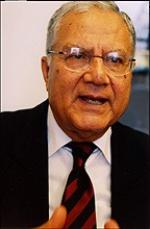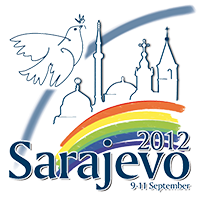
National Islamic-Christian Committee for Dialogue, Lebanon
|
To answer the question if Dialogue is valid 50 years after Vatican II, I have to underline three important issues;
1- Christian-Muslim relations before Vatican II,
2- The contribution of Vatican II to these relations,
3- Christian-Muslim relations after Vatican II.
(l) Before Vatican II relations were very negative and even destructive. It was based on mutual ignorance and arrogance. Here are two examples using a lecture prepared by Michael Fitzgerald 25 April 2000 as a reference.1
a- A "monk of France", probably to be identified with Hugh of Cluny (1049-1119), wrote to the Muslim king of Saragossa, Muqtadir Billah, a letter inviting the ruler to embrace Christianity. In it he spoke about the deception of Islam, attributing it to the work of Satan. He stated: "Satan.. deceived the children of Ishmael in regard to the Prophet whose mission they acknowledged and thereby drew many souls to the punishment of Hell.2
b- An earlier writer, George Hamartolos, this time not in the West but in the Byzantine Empire, complied a history of mankind from its origins to the middle of the 91th Century. He dedicates one chapter, chapter 235, to Islam. He compares Islam unfavorably to Christianity, stating that it is a religion which spring from a false prophet. "These foggy minded and stupid men", he writes, "refuse openly to examine the truest faith, sacred and guaranteed by God, while these hardened wretches accept the forgery to which this swindler gave the appearance of true religion"3.
(2)Vatican II and Islam
Here it is worth noting that:
a- " The interest of the Council for Islam arose incidentally, out of the desire to produce a declaration about the Jews. There was no intention of providing a full discussion of Islamic beliefs and practices".4
b- The declaration of the council addressed Muslims as believers not Islam as a religion, and as a message from God. But it made it clear that the people which acknowledges God in truth and serves Him in holiness are related in some way to the People of God (lumen Gentium 16) -it is in fact in this context that we find the first mention of Muslims- primarily as individuals, secondarily as belonging to a different religion.
The statement in Lumen Gentium (n.16) says: "The plan of salvation also includes those who acknowledge the Creator, in the first place among whom are the Muslims : these profess to hold the faith of Abraham, and together with us they adore the one, merciful God, mankind's judge on the last day".
(3)Christian-Muslim relations after Vatican II.
It's enough to compare between the two images of Islam before and after Vatican II in order to realize the importance and the profound change. It was a doctrinal change, that opened up bridges for mutual understanding and reconciliation. It was a change to the good and to the truth, since goodness, and truth are one.
From the Islamic perspective, to be a Muslim one has to believe in Christianity (and in Judaism) as a message from God. Doctrinally the Quran says about the Bible: "There is guidance and light in the Bible".. and "let the people of the Bible follow what God revealed to them in the Bible".
The Quran describes Christians as "believers" and says "they are most passionate because among them are priests and clergy", (taking into consideration that there is no priesthood in Islam). The Quran describes Mary as the chosen lady by God and the preferred by Him over ali women of the world.
The Quran describes Jesus as the word of God and a spirit from Him. Born from a virgin mother, and spoke to her the moment after birth. The Quran, though describes him as a prophet, speaks about his miracles including healing the sick and raising the dead, by the will of God.
Before Vatican II, these doctrinal principles of Islam were not known, or were not well understood.
Understanding these doctrinal principles of Islam helped the Vatican II to reconsider the position of the church regarding Islam and Muslims.
So the term brothers were used for the first time and several times, by late Popes in their reference to Muslims (Paul VI in Uganda 1969, and Pope John Paul II in Morocco August 1985 ).
Muslims are not any more devils, fool and foggy minded. And Islam is not any more a Christian heresy. Islam as described by Vatican II, is now a religion worthy of respect.
Muslims expressed honest openness and constructive desires to build bridges of respect and cooperation with the Roly See based on this outcome. Today there are many Muslim-Vatican religious committees for dialogue; for example with Al-Azhar of Egypt; with Al-El-Beit of Jordan, and with the Islamic call of Libya.
There are also many Islamic initiatives: "The common word of love of God and love of neighbor", the "call to know each other", but the most important is the one taken by King Abdullah Ben Abdel Aziz, king of Saudi Arabia. This initiative which the Vatican was and still a strong supporter, is now an international Organization for interreligious and intercultural dialogue based in Vienna.
To my knowledge it is the first of its kind in the Muslim world, and maybe the first of its kind in modem history, because it includes representatives of Christianity, Judaism, Hinduism and Buddhism.
The importance of this organization is not simply for being the outcome of an Islamic initiative, but because it is an initiative of the Custodian of the Two Holy Masques himself and of what he represents. The king declared this initiative after two preliminary steps:
a- Convening an Islamic conference in Mekka for religious scholars representing all Islamic confessions.
b- The symbolic visit of King to the Vatican and his cordial meeting with the Pope Benedict IVX
The Vatican participated drafting the constitution of this organization, and is an observer member in it.
So here we have two new principles:
First: Muslims as brothers to Christians, and Islam is a religion worthy of respect.
Second: Islamic doctrinal belief that Christianity is a Heavenly message from God and Islamic initiative to translate these beliefs into actions. These two principles open up the avenues of dialogue on both directions. Results so far, are good, but expectations are higher. There are mistakes, but we learn from our mistakes more than we learn from our achievements.
Mistakes indicate that we should do better, and more. Mistakes do not and should not mean that the concept of bridges building is wrong.
The question now is, is it worthy? The answer is simple. Imagine if the Vatican II was not there, where Christians and Muslims will be now? will be there diplomatic relations between the Holy See and Muslim states that represent about 1.5 billion Muslims?
A research published by Ipsos Mori, the global polling organization, and the
Tony Blair Faith Foundation, showed that:
a- 94% of respondents in three mainly Muslim countries (Saudi Arabia, Indonesia and Turkey) said that religion was important in their lives, where as 66% of self described Christians in 19 countries, said like wise. The percentage rises in the USA to 86%. The lowest is in France, 32%.
b- 61% of Muslims in the above mentioned three countries, said that they believe that their faith -Islam- is the only true path to salvation and paradise; only 19% of Christians were similarly confident.
This research indicates that -with the heavy historical background- there is high tendency in the Islamic world to consider any conflict or tension with the West as religious, or has a religious background or at least has religious consequences. The research indicates too, that for the West, what creates tensions with Muslims is not Christian teachings or different ideas about the nature of God, but the lack of any religion in the public or private lives of many westerns.
This raises the issue of the relationship between religions and traditions.
Westerns are more attached to traditions than to religions. Muslims do not disengage traditions from religion. So the clash of traditions between westerns and Muslims becomes a clash of religions, which is not. The truth is that, religion is not tradition.
Sometimes there are even contradictions between the two. Dialogue is the best and the safest way to deal with this delicate and sensitive problem. It has been proved again and again, that the only substitute to dialogue is confrontation. We tried it, and it lead to nowhere. With good will, and with good intentions, and with mutual respect to our both religious teachings, we should achieve more, and we can.
1 Michael Fitzgerald, “From Heresy to religion: Vatican II and Islam”. Lecture 25 April 2000
2 GAUDEUL, Encounters and Clashes, Vol.. II Texts, 396 p.
3 Ibid. Vol. III, p.19; cf. Vol. I pp67-68
4 Ibid.- Michael Fitzgerald |

